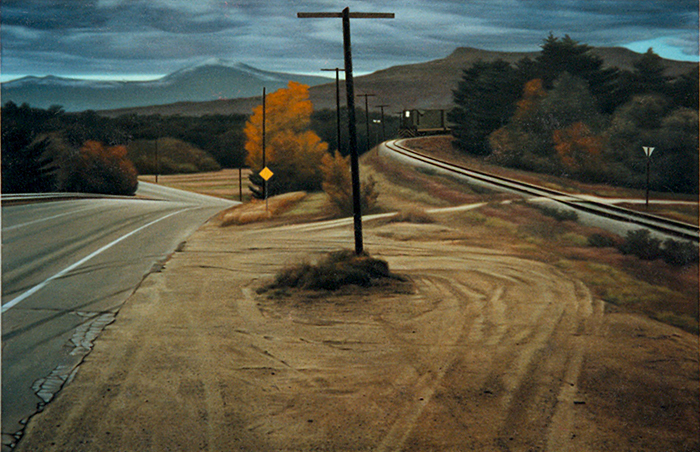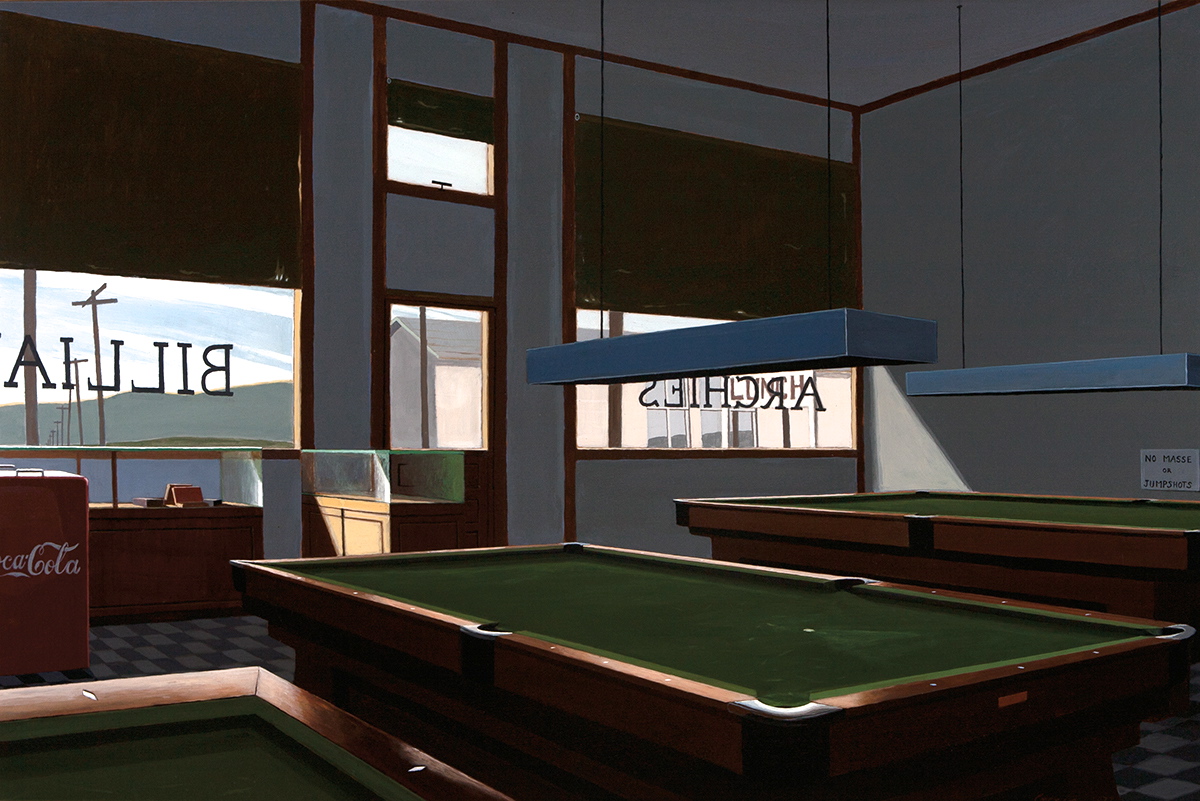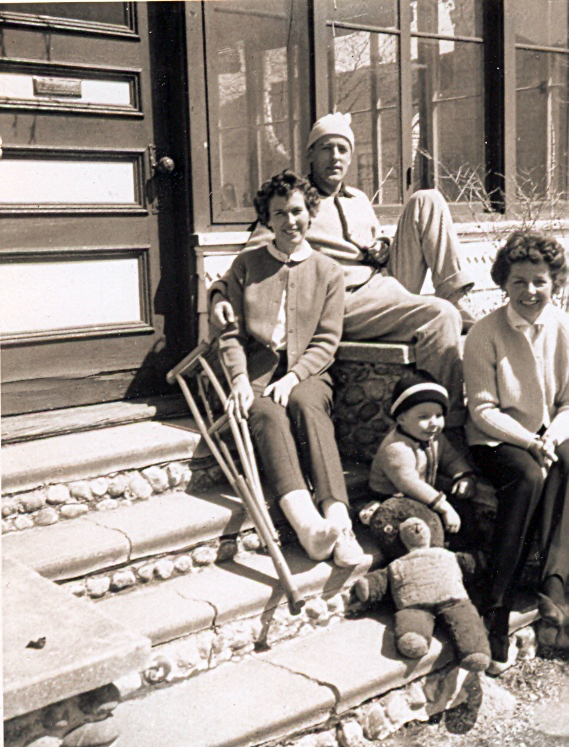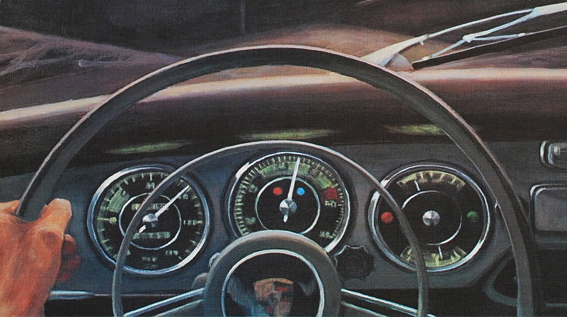
1992 oil on linen painting of Route 2 approaching the White Mountains along the Androscoggin River near probably Bethel.
Kris and I visited Uncle Don (in name only) who had a house on Islesboro and whom I’d known since 1970 when I first visited the island. Many of my firsts happened on Islesboro, like skinny dipping at night with girls at fourteen, or smoking my first corncob pipe, bought off the rack at the country store there, with Borkum Riff because I wanted to connect myself with the square-riggers printed on the pouch. Uncle Don thought I was brilliant for figuring out how to drill a hole in a hand-carved pipe stem. I burned it through with a red-hot piano wire heated on the gas stove. I learned from Mitch the other day that this was how Mainers made syrup spiles out of sumac. As an aside, my father could’ve bought 8 prime waterfront acres in 1968 for 2k. “Not a good buy,” he claimed to convince my mother who was all for it. “No one will ever want to deal with that ferry.” Thanks, Dad.
Donna was Uncle Don’s daughter and she was getting married the next day at eighteen years old, my age. It seemed way too young to get married although I would marry just a year later. To celebrate a kind of co-ed bachelor party, the three of us set off around the island in the Porsche with lots of beer. I think it was Tuborg or Labatts. We ended up next to the ocean in a moonlit bit of beach. Somehow I was invited to Donna’s top half and Kris to her bottom half. The three of us enjoyed this greatly until it was discovered that Donna’s grandmother’s engagement ring had vanished, which she desperately needed in mere hours. We sifted sand until dawn, and strangely I can’t remember if we ever found that ring or not. I do remember the sad weary blueness of all that sand in the hung-over dawn—we all felt terrible. Donna got married that day, and Kris and I slunk off on the early ferry back to the mainland.
The ferry docked at Lincolnville Beach where I had camped so many times during my past hitchhiking days. We stopped in Belfast, but once again could not find Sam Appleton although his restaurant was finished and operating. Leaving Belfast during that era, I always took the Moosehead Trail and then Route 137 through the rolling dairy farms. Same route I hitchhiked in 1973. I always utilized roads with cool names like the Mohawk Trail or the Pilgrim Highway, which filled me with romantic ideals.
Most early Maine roads were built across ridges and then they dip down to water—streams, rivers, lakes, where the towns congregate around since water was so vital. Dirt path from settlement to settlement, which were eventually widened and then paved, missing the correct base of gravel and drainage to prevent frost heaves. We drove past the paper mills of Skowhegan and Rumford, the stench in Mexico all but unbearable, an actual slap to the face and then an immediate sleeve to nostrils. It reminded me of Gorham when the Brown Company reek blew down the Androscoggin River. Of course I adored all this kind of thing back then, and still know a lot about paper mills and paper making, all my father’s inventions being within that industry.
Entering the White Mountains and arriving in your hometown, driving an early 356 Porsche, your own Porsche at the age of eighteen, after driving with your father so many times in his Porsches is a feeling beyond words. Past the Shelburne Birches, past Reflection Pond, past the Town & Country Motor Lodge, over the railroad tracks and the Peabody river (pronounced Pibbidy river) and up the steep drive to Prospect Terrace and the last house of three, my Godmother’s grand Queen Anne Victorian. Oh man, oh man!
Of course we played straight pool at Archies and drank a couple birch beers, a pop which I’ve never seen outside of New Hampshire. And for the one and only time Kris beat me at straight pool. He couldn’t miss a shot—perhaps the exact blend of pot and lack of sleep. I kept going outside to admire the sight of my beautiful blue coupe parked next to my favorite ever poolroom.
This acrylic on panel painting done in 1977, the first version of which Chuck Marsala bought in 1976.

We went to a bar then, probably up in Berlin, maybe the Club Joliette de Raccateurs, and at about midnight, I decided we would head for Lake Placid where Kris had a girlfriend he wanted to visit. I remember this old guy who owned the gas station where Route 16 joins Route 2 which then sets out alone for Vermont across the north slopes of the White Mountains, this old guy, really drunk, turned on one of his pumps so we could gas up, a lovely gesture, Kris and I then push-starting the 356 up the slight incline that became the enormous rise of Gorham Hill.
 My godmother’s porch in Gorham, with parents and my godmother in cast. I loved those field stone steps and rebuilt them for free during the 1980s.
My godmother’s porch in Gorham, with parents and my godmother in cast. I loved those field stone steps and rebuilt them for free during the 1980s.
 The house that began my obsession with Victorians and large houses in general. Hal Stowell and his Volkswagen the summer of 1972 when we drove from Massachusetts to Prince Edward Island to catch the total eclipse of the sun. That is another entire road trip story, which began many of the rituals that followed through the years. I must have been 15.
The house that began my obsession with Victorians and large houses in general. Hal Stowell and his Volkswagen the summer of 1972 when we drove from Massachusetts to Prince Edward Island to catch the total eclipse of the sun. That is another entire road trip story, which began many of the rituals that followed through the years. I must have been 15.
The headlights began to dim to the point where I simply had to shut them off just to keep enough juice in the system to fire the plugs through the coil and distributor. I stopped a few times to whack the voltage regulator, but the old generator was too worn to do much good. (Soon Inky Wardwell and I would replace the brushes in Sacks Harbor.) Kris kept falling asleep, and his head would snap backwards cruelly into nothingness because the Porsche seats did not include headrests. He’d wake from the pain, mumble illegibly and then repeat. This must have happened fifty times. It was a glorious run while the moon was out, but bizarrely dangerous when the clouds closed over our only light, and I put the car into a few panic slides to keep her from the void of true darkness and disaster. Kris bizarrely slept through it all.
I had not at this point memorized Route 2 from so many crossings as I have now. Of course in the last ten years much of the road has been straightened, and I no longer take the original pure Route 2 run through Lancaster, New Hampshire to cross the Connecticut River at Lunenberg, Vermont and enter what Stan Walker always called “The Waste Lands.”
The dawn lightened the world when we reached Rouses Point and Lake Champlain. I stopped the Porsche and simply got out and lay down exactly on the center white line, the lake perfectly reflecting the rose colored sky to become one like a vision of God. I was so elated I wasn’t even really tired although I was entering my third day without any sleep. I felt the cold damp Macadam on my back, I heard the 1500 tick as she cooled, I looked up at the sky and knew I had done it, achieved it, truly felt it—the road, the blessed road. 15 minutes of silence and bliss. Then I gave the car a light push, jumped back in, slipped the clutch in second gear and off we continued.

I
That black night, came out of black hills
Tired headlights eyeing the endless road.
Quiet constant: vision of one slant pole
Curving white line into the damp fog.
Last midnight gas, tired old drunk filling the tank,
Push-started, our heads bouncing with beer.
The old Porsche grinding out the distance,
Hill curves out of Vermont,
Kris your head snapping back in sleep,
Bridge into New York State,
Rose dawn falling in a clouded Lake Champlain,
Earth smell, the last sip
In a broken Thermos of coffee.
The toll bridge into New York State took our last coins leaving us 17 cents. I begged the sleepy guy in the booth—I’d woken him and could’ve just driven right by—but he insisted we pay. Now we didn’t have quite enough money for coffee, and we really NEEDED coffee more than the state needed our 50 cents. I couldn’t get on a pool table till afternoon, and I hated to play broke. It was poor ethics although sometimes it was unavoidable. That said, I very rarely lost when hustling. And then we arrived at the girlfriend’s apartment and Kris disappeared with her, as I fell asleep on a dirty sofa. It was about 8 a.m. on a Friday morning in late June 1975. That road run had ended. They all do . . .
Now, if you reread this poem, you’ll probably understand where every line came from:
ATLANTIC
On light wings we came
Following pretty girls in old cars,
Salt brine reaching our nostrils
Steaming from our pores.
With our youthful energy
We hot-highway-determined
Pulled the ripe scent of the country
Into the hanging mouth of the city
Noon sun flooding the windshield.
We found the familiar Poolroom
But all friends had since moved away,
Those times left in the dusty stale air
And on the wide dark stairs.
New addresses, an old Italian barber
giving us directions (a hundred hands)
We found only empty warehouses,
The freight yard with
Its barren ghost noises
Tar stench
No one.
Thus hot and bare-chested
We drove past the city blocks
(Dark-skinned girls gleaming on the cement corners)
Listening to the wailing strains of Charlie Parker,
Rolling smokes, gunning up the highway
Under nameless signs, The humid afternoon
Blasting through the windows
Into our hair.
Then the sun settling, spinning itself
Into the dusk-black sands of Cape Cod.
First lights blinking on,
Blushing evening, brush-stroke moon.
Other friends found with lone pay phone,
Hot coffee thoughts,
The last easy miles,
Grinning faces at the cambered porch,
The outstretched blue arms of the Atlantic.
Midnight we swam,
Salty, cold, naked, dangling,
We yelling into that huge caldron night,
The moon a perfect scratch in the blackened metal:
Silver, new, curled—and our voices
seasoning the mild ever-retreating air.
The morning opened
Hinged on the horizon of the ocean,
We followed the coastline north, uncomplaining
Hungry for every moment,
The small Porsche our home,
The glove box lid our table,
Eating powdered sugar donuts,
Splashing down sweating cartons
Of cold milk.
Kris, your straight nose in the sun,
Your hairless chest shining,
Your eyes licking the long green hills.
So the miles laid themselves short,
So we tore them off as if the road
Was a long strip of paper,
So we saw all the tanned faces
Followed all the trucks
Smelled the summer night deep
The silver ocean,
Rumbled by all the June days
Like a kick stone down a smooth hill.
II
That last night at Hal’s cabin,
We three rattled over dusty dirt roads
To the Spring Hill Diner.
And under the flickering neon,
We grumbled out of drunk night
To the bright white counter,
The wall menu, the thick cups of coffee.
Hal went to bed early that night
As he does often now:
His energy burning out early,
His poetry like a long-since-shaved beard,
Life hung on his strong shoulders
Like great flour sacks of earth,
His days hard beside an angry woman.
Yet still his eyes searched out
The fruit of the night
Its juice wetting his lips.
That last night, over the last beers,
Our words grafted us together;
The beer cold in the swooning June air,
Flies aiming for a hole in the sky.
And you—Kris
Your eagerness lighting in your smooth face,
Your ego like a draft,
Your lack of attachment supposedly a vision.
We slept on the cabin floor,
Morning the rooster woke us,
Hal rummaging back
Into the pattern of his days:
A clean shirt
His honest good-bye
A poet’s finesse
Still on his eyebrows,
Lost only
In an angry world.
Both poems written by Eric Green in 1975
